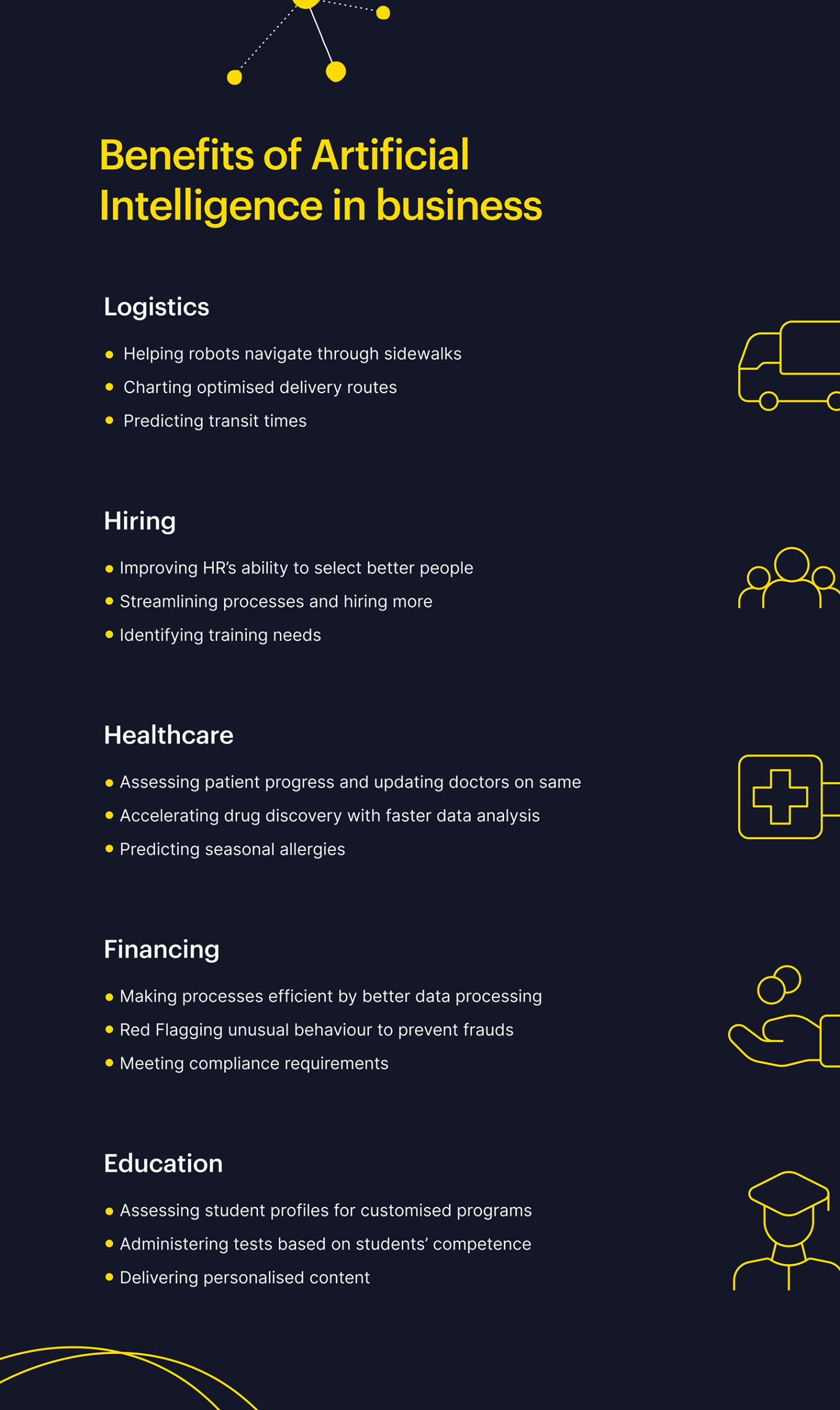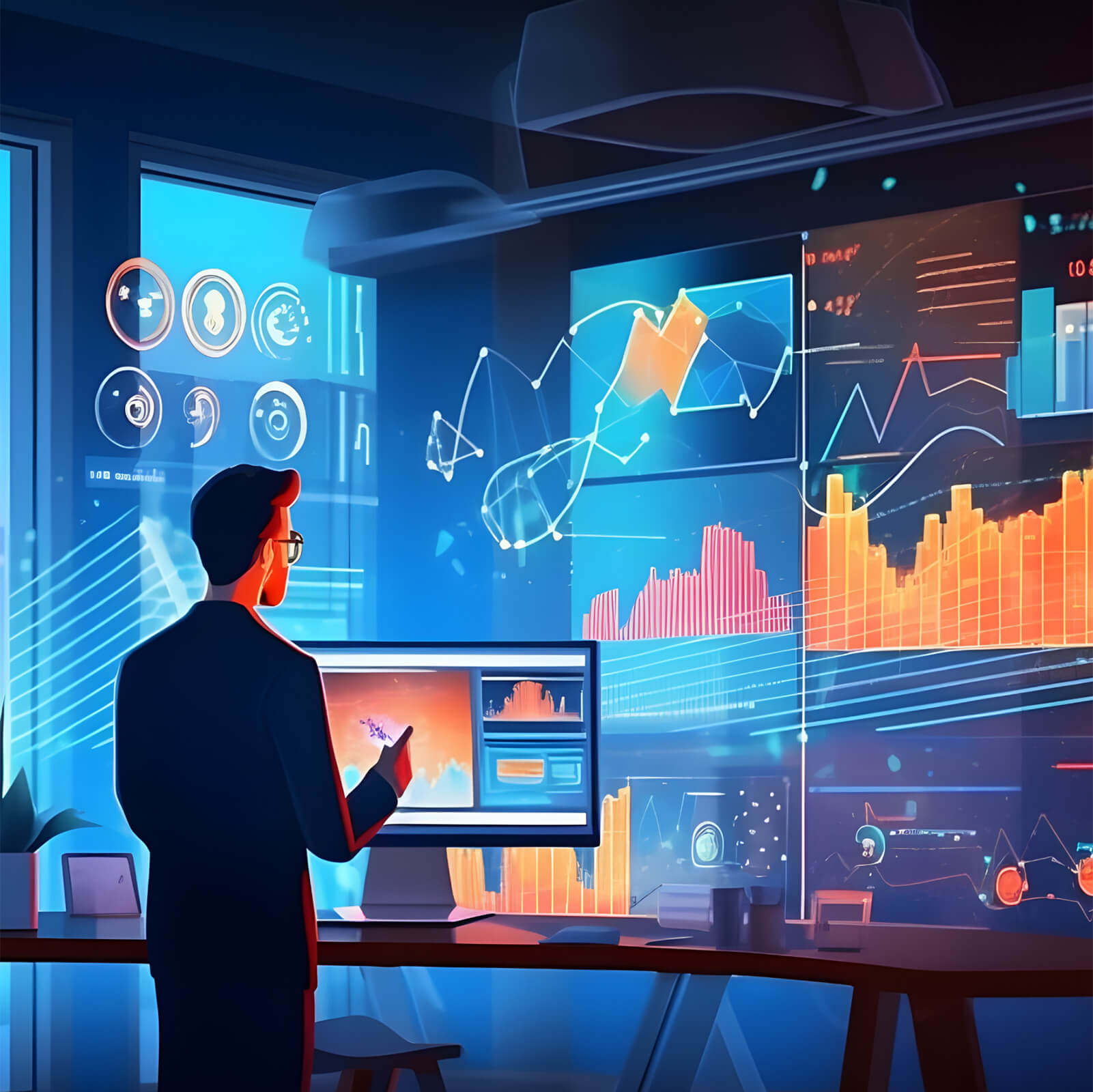The role of artificial intelligence in business: Technologies and use cases

A Gartner study says the global artificial intelligence software market is expected to reach $62 billion in 2022. The uses of artificial intelligence are numerous and spread across multiple industries, making it a unique technology that is vital to stay ahead in today’s world. To fully harness the power of artificial intelligence, one must understand it first.
What is artificial intelligence?
Here’s a simple definition of artificial intelligence: Artificial intelligence is the science of creating intelligent machines that can think, learn, analyze and respond like humans.
AI is a branch of computer science because the creation of such ‘intelligent’ machines involves the design and development of computer systems, software, and computer-controlled robots with the intelligence and cognitive skills of humans.
A term you sometimes hear with AI is cognitive technologies. Cognitive technologies have emerged from AI and can more closely mimic the functions and abilities of the human mind.
In this article, we will cover various AI tools and technologies and then discuss specific use cases of AI from various industries. Finally, we will talk about making organizations AI-ready. Let’s get going!
How AI is changing business: AI tools and technologies
Of the many technologies in AI, a few are still in the experimental stage. Thankfully, there are many technologies that are already proven and widely adopted.
Here are the established ones that will better explain the technologies related to AI:
Speech recognition
If you’re trying to answer a question like ‘What are the applications of artificial intelligence?’, speech recognition is a great place to start with.
Speech recognition is the capability of a machine to accurately understand human speech and carry out actions like converting it into text or following instructions. It is also known by names like automatic speech recognition (ASR), computer speech recognition, or simply speech-to-text technology.
Because it can understand the human voice, speech recognition can be used to transcribe interactions (e.g. between a doctor and a patient), handle telephonic requests (e.g. phone-in for customer service), and so on. It can slash waiting time, improve customer service, and speed up operations, among other things.
Natural language processing
Natural language processing can be defined as the ability of a machine to read, understand, and generate human language. Better still, this technology can even detect the underlying sentiments.
A popular application of natural language processing technology is digital virtual assistants (think Siri and Alexa). This technology can ‘translate’ human language into the format that the machine understands, thereby enabling the machine to respond and execute tasks (‘Alexa, play the Moonlight Sonata.’).
You begin to better grasp the growing impact of AI on business only when you realize that this technology can do even more. It can meaningfully process documents by identifying the crux of the document as well as the people and places the document refers to.
Machine learning
Machine learning is a branch of AI that enables systems to learn from data and improve from their own ‘experiences’. This improvement happens because the system can identify patterns and create models from its exposure to data.
A good example of machine learning could be a self-driving car. As the system is exposed to more data, it begins to differentiate between objects (a moving vehicle vs a stationary object like a tree), understand traffic laws, learn to navigate through obstacles, and more.
A more sophisticated application of machine learning would be fraud detection. The system understands current patterns that fraudsters use, helps in preventing frauds, and also spots likely loopholes that fraudsters will exploit in near future.
Computer vision
Computer vision is the ability of your computers to visually identify objects, people, and activities. Put differently, this particular capability lets your system visually interpret the world all around.
One of the many benefits of artificial intelligence in business is how computer vision can take e-commerce to the next level by letting shoppers shop for objects they have photographed elsewhere. It can bring tremendous speed and accuracy to disease diagnosis and treatment. It can also bring near cent-percent reliability to security and surveillance.
While this technology is nearly perfected for pre-defined or constrained industrial settings, there’s still some work to be done in uncontrolled, open environments.
RPA-optimized hardware and other technologies
There are many more technologies you can study to further understand how to use artificial intelligence in business.
For instance, intelligent automation (RPA + AI) has created ‘cobots’ that carry out complex tasks along with, or sometimes independent of, human workers. Artificial neural networks powering deep learning are processing data faster and more meaningfully.
While these technologies are centered around business and industrial applications, there are a few consumer applications too. For example, you find ‘smart’ robotic home helpers. Bots that help people in their transactions with financial institutions are becoming more common.
The role of artificial intelligence in business: specific use cases
That AI is set to have a far-reaching role in businesses is evidenced by the fact that most businesses deploy not one but multiple technologies used in AI.
Here are some examples of industries and organizations with successful AI deployment:

AI in logistics and transportation
AI is used to reliably chart out the best delivery and shipment routes by optimizing factors like speed, costs, delivery security, and the overall experience. The following examples will further establish the growing impact of AI on business:
- FedEx has successfully tested a same-day delivery bot Roxo that can easily navigate through sidewalks and roadsides. It can interact with the surrounding world with its 360-degree sensors and communicate with people around, using its microphone and speaker.
- A machine learning tool that DHL has developed analyzes 58 factors to predict the changes in air freight transit times and likely delays, up to a week in advance. This is critical because on-time shipments constitute 35% of freight value.
AI in recruitment and HR
HR departments of businesses as well as independent headhunting organizations are putting AI to use and improving their processes and outcomes.
- DBS, the Singapore-headquartered multinational bank, introduced JIM (Jobs Intelligence Maestro), a recruitment bot powered by AI. Using Jim, the bank expects to hire 40% more wealth managers, and streamline processes. They foresee a saving of about 40 man hours a month, a time that their teams will use to focus on talent advisory or for upskilling themselves.
- AI can accurately identify training needs and greatly improve the hiring team’s ability to select people with a higher probability of contributing to organizational growth.
AI in pharma and healthcare
Perhaps the most valued applications of AI lie in the pharmaceutical industry and healthcare industries. From drug discovery and pandemic predictions to diagnosis and surgery, recent advances in artificial intelligence are making a huge impact.
- The pharma giant GSK (GlaxoSmithKline) is working on using AI to predict how the next season will impact cold and allergies in people. This helps them remain optimally stocked at the right locations and plan campaigns accordingly.
- AI can be employed to remotely monitor patients and update doctors. For instance, an AI-powered app inside a smartphone can assess the motor skills of patients suffering from Parkinson’s disease. After that, the AI sends doctors a report, based on which the doctor can change drugs or dosages.
AI in financial institutions
The role of artificial intelligence in business is nowhere easier to apply than in financial institutions. That’s because the entire financial sector runs on number-crunching, something that it shares with cognitive technologies, artificial intelligence, and machine learning.
From competent chatbots for customer service to digital assistants that help customers with their investment decisions, AI is helping banks scale operations, serve customers, fulfill compliance requirements, and improve margins.
- Advanced AI solutions can identify unusual behavior in banking transactions and correctly red-flag them. They spot new anomalies faster and yet reduce false positives.
- Banks and organizational lenders can rely upon the ability of AI to put together copious amounts of data to make lending efficient. This can reduce lending risks without altering the approval rates and even improve turnaround times for funding requests.
AI in education and training
Among the businesses using artificial intelligence, the whole new breed of edutech startups and unicorns are some of the biggest evidence of the tremendous value that AI can unlock. AI can assess individual student profiles to create customized programs, administer appropriate tests to each student, and even help with the motor skills of differently-abled students.
- AI breaks down each subject into topics and each topic into micro-topics. The AI will test students in the micro-topics and, by iteration, accurately figure out the student’s understanding of the topic and tailor-design courses and quizzes to continually improve the student’s proficiency.
- Various edutech firms are leveraging AI to create and deliver personalized educational content, filling the gap created by the absence of personalized attention in classrooms.
Benefits of artificial intelligence in business
While specific advantages that businesses draw from using AI are most evident from the use cases cited above, here are some of the common benefits of using AI in business:
- Scalability: AI can handle incredible amounts of data. So instead of holding you back, data can now help your business scale with confidence.
- Speed: The super-fast data processing abilities of AI lets your business respond faster and better to changes as well as requests. That cuts down your time-to-market and makes you agile in customer-facing interactions.
- Reliability: By practically eliminating the scope of human errors, AI brings unprecedented accuracy and reliability – something critical for industries like healthcare, aeronautics, and finance.
- Efficiency: AI can let you do many, many more tasks at never-before levels. With more relevant data and precise insights, your business efficiency quickly rises.
- Cost saving: With nearly no errors, faster turnaround time, and reliable data, your costs remain far below earlier levels. This lets you invest in customer satisfaction, R&D, and other priority areas with more freedom.
- Extrapolation: A strong ability to accurately study past trends from tons of data and figure out future trends empower AI to help plan your future course of action much more confidently.
- Value-creation: The use of artificial intelligence in different sectors has shown how it can create multifaceted improvements and add tremendous value to your business.
Making organizations AI ready
Naturally, you have a question: How do you implement AI in business? Improving the AI readiness of your business will ensure you derive all the benefits of artificial intelligence in your business.
Begin by separating business processes to the degree to which they can be automated. Next, present your case to get buy-in from stakeholders across different levels. After that, you can rope in an expert AI technologies company to help you set realistic expectations and establish clearly defined goals.
Digital transformation needs attention to detail and expertise, something only seasoned players can bring to the table. We’ve delivered diverse projects in the past and we would be happy to talk to you.
Why not drop us a line and take the first step towards making your organization future-ready?
Case Studies
Let our work do the talking
Learn about the instances where we were able to create an impact, raising the bar on the standards we set for ourselves.

PiServe — Revolutionizing the versatility of technology in the corporate world
Curated Technologies. Design at Heart. Rapid business Transformation
Insights
The information technology times
Have a read on groundbreaking figments of imagination of the brightest minds that have been brought to life.
How can we help you?
Get in touch and let’s find out how we can curate our offerings to match your organization’s needs.
Get in touchSign up for our latest insights.
Never miss an insight. We’ll email you when new articles are published.
Subscribe.
Thanks for subscribing to PiServe Insights.
Please fill in the details.










